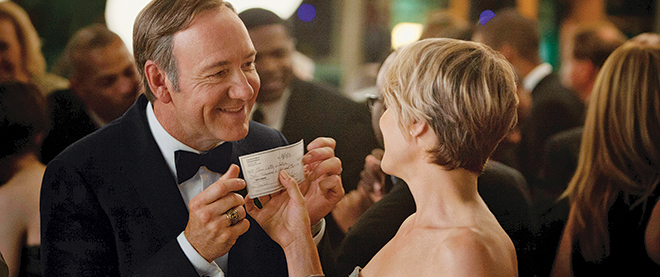A flimsy House of Cards, and the question of quality TV
Distinguishing the signifiers of great TV from actually great TV
Patrick Harbron/Netflix/Everett Collection
Share

House of Cards has everything it takes to be a quality show. It has a middle-aged male anti-hero (Kevin Spacey). It takes on a serious subject, U.S. politics, in a cynical manner. And it’s shot like a feature film, in the style of David Fincher, who produces the show and directed the pilot. Yet the Netflix series, whose second season premieres on Feb. 14, hasn’t made it into the pantheon of can’t-miss dramas like Mad Men or Breaking Bad. Call it a new kind of show for an era where TV is taken seriously: a show with all the signifiers of great TV that isn’t really great.
“I think House Of Cards is a ‘quality’ show that’s lacking,” says Todd VanDerWerff, TV editor of The Onion’s AV Club. “I liked individual performances or elements, but it has no real point beyond telling us, over and over, that politics is corrupt, and aren’t we smart for being cynical about the whole business.” This kind of reaction was common enough that the first season of the show received mixed reviews and managed only one major Emmy award, for Fincher. And in contrast to Mad Men’s huge cultural impact, House of Cards hasn’t caught on except in Washington, where President Barack Obama enjoys how “ruthlessly efficient” Spacey’s anti-heroic Congressman is in getting things done.
At least House of Cards has some admirers; more often, would-be quality dramas don’t even get that much. AMC, the network of Breaking Bad, tried to debut other shows in a similar style with mixed success; Low Winter Sun, a cynical crime drama in the style of The Wire, got dismal reviews and folded after one season. Another network, Starz, run by former HBO boss Chris Albrecht, rolled out one failed “quality” drama after another, from the cynical political show Boss (starring Kelsey Grammer as a corrupt mayor) to the cynical period drama Magic City (starring Jeffrey Dean Morgan as a corrupt hotel owner).
It may be that the rules for making a quality drama, as laid down by The Sopranos in 1999, have become over-familiar. Jason Mittell, professor of American studies and film and media culture at Middlebury College and author of the book Complex TV, calls it an “example of the phrase that some TV scholars have used: ‘innovation/imitation/saturation,’ ” where a revolutionary style gets co-opted and becomes dull.
Everyone has a favourite example of the low-quality quality drama. Christopher Bird, who writes a TV column for Torontoist, points to House of Lies, a cynical Showtime drama about amoral consultants: “It wastes the actors, the style is grating and the writing is just bland.” VanDerWerff picks Ray Donovan, a cynical Showtime drama about an amoral consultant, “simply because it’s so well-worn at this point. The show seemed to spend roughly half its first season having characters talk about how awesome Ray was, so that the audience would always be aware we were supposed to think he was cool.” And Canadian TV journalist Diane Wild says she finds it annoying when Downton Abbey is considered great TV: “It became impossible to ignore that this is kitsch dressed in Edwardian finery.” These shows present themselves as hard-hitting antidotes to the status quo, but with their similarly dark perspectives and soapy plots, they may be just as much a part of typical TV as any bland crime procedural.
Still, Mittell says, just because there’s been a glut of this kind of drama doesn’t invalidate truly great shows in the subgenre, like Masters of Sex, an anti-hero drama about sex researchers Masters and Johnson that recalls Mad Men but found its own distinctive style. “Being imitative should not be an automatic knock against a program—pretty much every great TV show builds off predecessors.” And sometimes a show can start off disappointingly and turn itself around. Boardwalk Empire, a cynical crime drama, originally didn’t quite live up to HBO’s hype, but has grown in esteem over the years; Bird says “it’s so atypical in how it approaches the anti-hero drama that it has become brilliant.” The question for the second season of House of Cards may be whether it too can find its own distinctive take on the anti-hero style. That may be the only way to make the jump from a “quality” show to just a quality show.